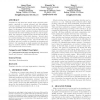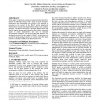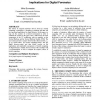SAC
2006
ACM
14 years 5 months ago
2006
ACM
ArchiTRIO is a formal language, which complements UML 2.0 concepts with a formal, logic-based notation that allows users to state system-wide properties, both static and dynamic, ...
SAC
2006
ACM
14 years 5 months ago
2006
ACM
Templates in web sites hurt search engine retrieval performance, especially in content relevance and link analysis. Current template removal methods suffer from processing speed ...
SAC
2006
ACM
14 years 5 months ago
2006
ACM
Many embedded systems are designed to take timely reactions to the occurrences of interested scenarios. Sometimes transient overloads might be experienced due to hardware malfunct...
SAC
2006
ACM
14 years 5 months ago
2006
ACM
Aspect–Oriented Programming (AOP) is increasingly being adopted by developers to better modularize object–oriented design by introducing crosscutting concerns. However, due to...
SAC
2006
ACM
14 years 5 months ago
2006
ACM
This paper describes an implicit segmentation-based method for recognition of strings of characters (words or numerals). In a two-stage HMM-based method, an implicit segmentation ...
SAC
2006
ACM
14 years 5 months ago
2006
ACM
In this paper we introduce a group-messaging interface that allows humans to efficiently interact with a group of agents through a hierarchical and customizable text protocol. Our...
SAC
2006
ACM
14 years 5 months ago
2006
ACM
We solve the consensus problem using a new class of broadcasts that are very appropriate to ad-hoc networking: every broadcast message is eventually ensured to be garbagecollected...
SAC
2006
ACM
14 years 5 months ago
2006
ACM
The release of computer hardware devices based on “trusted computing” technologies is heralding a paradigm shift that will have profound implications for digital forensics. In...
SAC
2006
ACM
14 years 5 months ago
2006
ACM
SAC
2006
ACM
14 years 5 months ago
2006
ACM
We provide sufficient conditions that formally guarantee that the floating-point computation of a polynomial evaluation is faithful. To this end, we develop a formalization of �...



